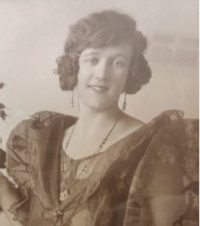Many things have taken place since I have last written.
On March 7, 1943 Coné sent two men (one of them a Philippine Army G-2, and the other one was Agustin’s houseboy who knew of our whereabouts). They arrived at our mountain hideout at 4:00 p.m. on March 8. Coné wants us to go with them to Iloilo at once, as there are rumors that trouble would begin again any day. I have decided to make the trip by sailboat, as I can bring more of our belongings. If we went over land, it would be hard to get through the lines and I felt I just could not take a long hike again. Mr. J, our guide, left early the following morning to Barotac to see Agustin about a boat. He was able to get quite a large one for 150 pesos.
We left our mountain hideout in the mountains of San Carlos at 2:00 p.m. and arrived at Dunglaan (our point of embarkation) an hour and a half later.
The “parao” (sailboat) we were to take was late in meeting us, so we had to wait for the tide. We ate our supper on the beach. Rose and Estrella, along with eight men who carried our cargo, waited with us until we could sail. We were all very tired, so I opened up the mattresses and laid down. The children were able to sleep, but I was too impressed with the beautiful canopy of twinkling stars. The new moon and the evening star were setting when I heard the tide coming in. The gentle waves became stronger, and it was only a matter of a few minutes when the boat came nearer to the shore.
Estrella’s eight men began loading our cargo, of which I brought more than I expected. By 1:00 a.m. we were ready to hoist our sails. Estrella and Rose were anxious and worried about us as we had heard so many rumors of the Japanese machine gunning sailboats. This boat carried a crew of 10 men, so you see it was quite large. We said goodbye to Rose and Estrella and left.
There is always a Japanese motor boat patrolling the coast, and we could hear it as we left the shore, but as there was no moon, and we carried no light, the danger of being seen was lessened. Our trip was pleasant, with just enough wind to carry us nicely. We were all good sailors, with the exception of Hector (Estrella’s son, who accompanied us), who said he felt a little sea sick. We met two other “paraos” in the dark and off in the distance we could hear the sound of a motor boat.
The dawn of a new day was breaking in the eastern sky when the helmsman sighted Bito-on, our landing place. The tide was going out, so the boat could not go very near the shore. I felt somewhat nervous, as we could still hear the motor boat, but could not see it, and I was afraid of planes. The men were jittery and were rushing the unloading. The water was up to their chests and most of the cargo had to be carried on their heads. John (our cook) took care of the three dogs (they enjoyed their swim), the cats and birds. The children were carried off the boat, Dolly and I rode a small banca (canoe) which our guide was able to secure.
We attracted a great deal of attention, and many people came to greet us with the news that two days ago the Japanese machine gunned their barrio, thinking that some of the Philippine Army soldiers were there. The landing place was still being watched by the Japanese and had been closed to all crafts. You can imagine the reaction of the crew when they heard this bit of news! They lost no time and hurriedly raised their sales and pulled out!
The sailboat had not gone very far when the Japanese patrol boat passed by. Thank goodness we did not run into them!
Dolly and I were wearing slacks and we were told by the people that the Japanese did not like women wearing slacks as they were too masculine. So we changed clothes in a nipa hut. Our guide was able to secure 10 men and two carabao carts. We were anxious to get started as the sun was beginning to get hot and we had about a 1/3 of a mile hike. Our cargo had to be carried about 1⁄4 mile to the carts. It was noon when we finally got started on our way.
Halfway to Jaro, Rite, one of the police dogs, collapsed from the heat, and had to be put in one of the carts. Soon we came to the Jaro bridge and met our first Japanese sentry. We bowed in the traditional Japanese way, and he asked where we came from, and where we were going. After answering all questions, we proceeded on our way to the next sentry, where we were questioned again. Two Japanese soldiers accompanied us all the way to the Bernas house in Jaro for further investigation. I did not happen to have my pass, as I had destroyed it when the guerrillas became so active. The following day the Japanese Military Police came to the house and I was told it wasn’t necessary for me to have a pass. So now I am a free citizen to come and go as I please.
You can imagine our happiness at seeing each other after 10 months of uncertainty! Coné had recuperated from his illness and hazardous trip. We were all very tired and weary, but a nice cold glass of water and a good lunch that Dorothy prepared soon revived us.
